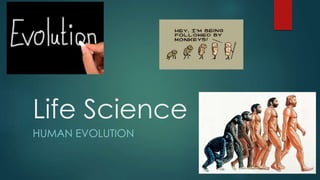Life science evolution
- 1. Life Science HUMAN EVOLUTION
- 2. The theory of evolution In basic terms the theory of evolution is the belief or theory that all life on earth and all life forms evolved (develop, gradually change or mature) from one ancestral creature. Human evolution is referred to as the evolutionary process leading up to the modern day appearance of Homo sapiens or as we know them, humans. It’s the process of change by which people or human beings are thought to have originated from apelike ancestors and to majority of the work the theory of evolution is closely associated with an image showing how physical similarities indicate that modern human species are closely related or have a close relationship to another group of primate species, the apes, an example of he image ( top left corner )
- 3. Homo species Homo – Definition noun (taxonomy) A genus comprised of primates characterized by bipedalism, skills in tool usage, and large cranial capacity List of homo species Homo habilis Homo ergaster Homo erectus Homo neanderthalensis Homo sapiens
- 4. Homo habilis Earliest fossils placed in Homo gene. Approximate age: 2.4 to 1.6 million years Stone tools found giving the species its name, ‘ handy man’
- 5. Homo ergaster First fully bipedal Homo species Large brained Existed between 1.9 and 1.5 million years ago Shows decrease in sexual dimorphism compared to ancestors Where previously assigned to H. Erectus
- 6. COMPARISON BETWEEN HOMO ERECTUS AND MODERN MAN
- 7. Homo erectus Originated in Africa about 1.8 million years ago First hominin to leave Africa
- 8. Homo neanderthalensis Lived in Europe and West east from 200 000 to 28 000 years ago Thick boned Large brain Buried their dead Made hunting tools
- 9. Homo sapiens Appeared in Africa by 195 000 years ago All humans are descendents from African ancestors Oldest fossil outside Africa about 115 000 years In 2004, 18 000 year old fossil was found in Indonesia and a new small hominin was named- Homo floresiesis H sapiens is the first group to show evidence of symbolic and sophisticated thought.
- 10. Homo floresiensis In 2004, 18,000 year old fossils were found in Indonesia, and a new small hominin was named: Homo floresiensis
- 11. Austrolopiths Any of several extinct humanlike primates of the genusAustralopithecus and closely related genera such as Ardipithecusand Paranthropus. List of Austrolopiths Australopithicus africanus Australopithicus afarensis
- 12. A.africanus Meaning “Southern ape of Africa” Walked upright ( bipedal) Humanlike hands and teeth Had a brain 1/3 of modern humans An example : Mrs Ples Lived more than 2 million years ago in the cradle of Humankind
- 13. A.afarensis Discovered in Afar ( Ethiopia) in 1974, known as Lucy Brain size of a chimp Longer lower jaw Arms are were longer than humans ( arboreal movement)
- 15. END
- 16. SUMMERY OF OUR “ANCESTORS
















